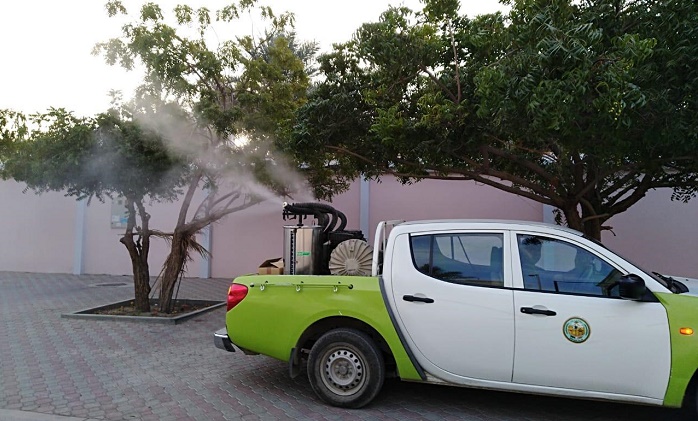
Muscat: To prevent the spread of dengue and other diseases transmitted by the aedes mosquito, the Ministry of Health and Muscat Municipality have begun a joint plan of action.
Muscat Municipality will spray insecticide in the neighbourhoods of the capital area to prevent mosquitoes from breeding. On 27 March, measures to prevent the spread of mosquitoes were carried out in South Ghubra, Al Ansab and Al Hail.
“In a joint programme carried out in cooperation with the Ministry of health, Muscat Municipality initiates its pest control campaigns targeting neighbourhoods of Muscat Governorate,” said a statement from the municipality. “The programme aims to identify mosquito breeding sites and foci that are suitable incubators for mosquito larvae.
“Besides intensive spraying operations, the teams will be tasked to get rid of solid and household wastes and all forms of stagnant water as these areas serve as a suitable environment for mosquitoes to breed,” added the organisation.
Muscat Municipality has technical teams consisting of 73 supervisors and 172 technical and pest control workers equipped with vehicles and modern equipment. There will be 248 fog sprayers and 286 machines deployed to eradicate breeding spots for the insect. All preparations have been made to carry out periodic and emergency work by investigating mosquitoes and their breeding patterns in an outdoor environment and to dispose of them in an optimal manner.
“These efforts stem from Muscat Municipality’s obligation to maintain the health and safety of community members and to combat sources of pathogens as well as to strengthen the preventive and awareness aspects to check the spread of diseases,” added the statement. “The municipality urges all to contribute to the success of these campaigns and stresses the importance of adopting hygiene practices to stop the spread of mosquitoes.”
Existing laws prohibit certain activities as they promote the spread of pests and increase transmission of diseases. Under Article 45 of local order 1/2006, owners of properties are obliged to take measures to prevent breeding of rodents or spread of mosquitoes and other insects on their properties.
Occupants of homes are also prohibited from keeping poultry or birds, as per Article 46. Article 48 states that building owners and contractors are fully responsible, during the period of construction, to prevent insects and rodents from reproducing, either in the building, or in areas such as water and sewage tanks and pipes.
They must also ensure the building is free of insects and rodents once the work has been completed. Article 50 states that septic tanks, sewers, manholes and water and ventilation pipes must be kept closed and intact. A mesh must be placed over them to prevent mosquitoes from entering them.
Should owners of multi-storey buildings not comply with proper cleaning standards, pest control and waste disposal, they would be slapped a fine of OMR300 under administrative decision no. 55/2017. They will be given three days to correct the anomaly which, if repeated, leads to a doubling of fine. If sewage leaks are found or drainage lines are not maintained properly in commercial, industrial, residential or tourist buildings, a fine of OMR1,000 is imposed, while a fine of OMR3,000 is imposed if the violation is repeated. Those found at fault for these issues are given one day to correct them.
In an advisory video, the Ministry of Health explained the breeding patterns of the aedes mosquito. “The aedes aegypti mosquito is an insect that is active during the daytime and reproduces when a female mosquito lays her eggs in stagnant water,” said MoH. “It causes transmission of many diseases like yellow fever, zika and dengue fever.” Symptoms of dengue include high fever, severe headache, pain behind the eyes, rashes, muscle and joint pain, loss of appetite, nausea, vomiting and a general feeling of illness.
“Dear citizen and resident, recognising and taking corrective actions will prevent breeding of mosquitoes,” said MoH. “These include emptying water containers and cleaning them every day, proper coverings over water tanks, getting rid of stagnant water and taking personal protective measures to avoid mosquito bites by wearing clothes that cover most of the body’s surface. Use mosquito repellents, window nets and insecticide spray, although you must exercise caution to prevent toxicity.”